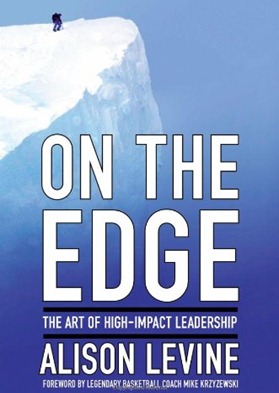Sitting in a cold auditorium is how I might have started many nap stories during college, but in 2012 at a work convention I stumbled upon what is to date one of my favorite speakers.
Alison Levine.
In fact, I shared with you the tremendous lessons from that event in How To Climb Mount Everest {clearly lessons and not an actual guide}.
**Note: Today’s post was scheduled prior to the recent tragic events. Having read this book, I have a much greater understanding of the work those Sherpa’s do each year to make it possible for others to summit Everest. It’s one of the most selfless jobs I can imagine.
Her speaking style combined with imagines of climbing Everest give you an immediate take charge of life, be bold and work hard feeling. Her new book: On the Edge: The art of high-impact leadership, tries to capture that feeling, but it’s hard without her in person enthusiasm.  This is a FASCINATING book filled with a ton of great insights told through the adventures of her summiting Mount Everest, skiing across the Antarctic and those around her.
This is a FASCINATING book filled with a ton of great insights told through the adventures of her summiting Mount Everest, skiing across the Antarctic and those around her.
As always Cliff notes for those who are considering reading it or simply don’t have time:
Titles: Leadership skills aren’t the result of title or a promotion. “Leadership is an attitude.”
Passing limits: “Once you’ve been there–in that place of feeling like you’ve got nothing left, and you’ve pressed right on through it — you know you can do it again and you aren’t worried about it.” <<Hello marathon running!
 Two steps back
Two steps back
“..we tend to think that progress has to move in one particular direction, but that’s simply not the case. Sometimes you do have to go backwards–away from your destination– in order to reach it.”
Teamwork
“A group is only a team when every member of the group cares as much about helping the other members as they care about helping themselves.”
Networking Lifesaver
“…people will always be more inclined to help people they know…” Why it’s worth the time to get to know those around you in every situation.
Complacency
It’s easy to stop paying attention when life feels routine. There is a reason most accidents happen within a mile of home.
Excel despite limitation
Stop trying to overcome your weaknesses and focus on how your strengths can benefit everyone. Allow your team to do the same! Think of all the huge entrepreneurs like Jack Welch and Richard Branson who grew up with issues like dyslexia or stammering, they didn’t try to overcome their weakness they compensated with great strength in other areas.
Frugal, not cheap
“Don’t put yourself or your team at a disadvantage because you didn’t bother to get the proper equipment.” Get creative, do some digging and invest in what’s required to be successful.
Situational action
You can’t control everything. “The key to surviving storms is the ability to take action based on the situation at the time, regardless of the plan.”
Failure happens
Even some of the best climbers have yet to summit Everest because in those final moments near the peak the weather has turned bad…months of climbing and no summit. For some it’s failure, for others it’s another experience, new lessons and an amazing achievement. You have to be willing to fail to improve your skills.
Past motivational book recaps:
Lessons for peak performance {Eleven Rings}
11 Laws That Will Change Your Life
The Start Here Diet
Top 50 running books
Have you heard any really great speakers lately?
Do you agree with her definition of a team?
OTHER WAYS TO CONNECT
Get each new post in your inbox — talk about speedy service
Continue the running conversation with others on Facebook.



 21 Sneaky Vegetable Recipes: They Won’t Even Know They’re Eating Veggies
21 Sneaky Vegetable Recipes: They Won’t Even Know They’re Eating Veggies
